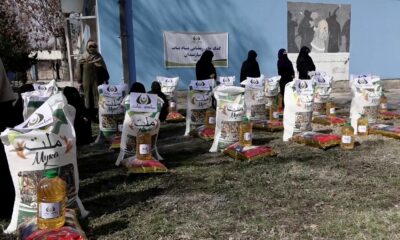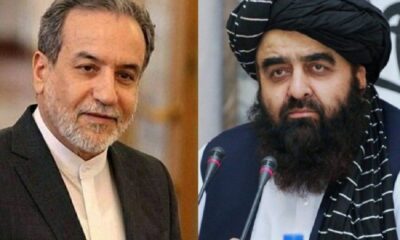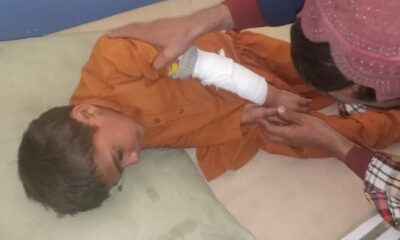COVID-19
17 Loya Jirga delegates test positive for COVID-19
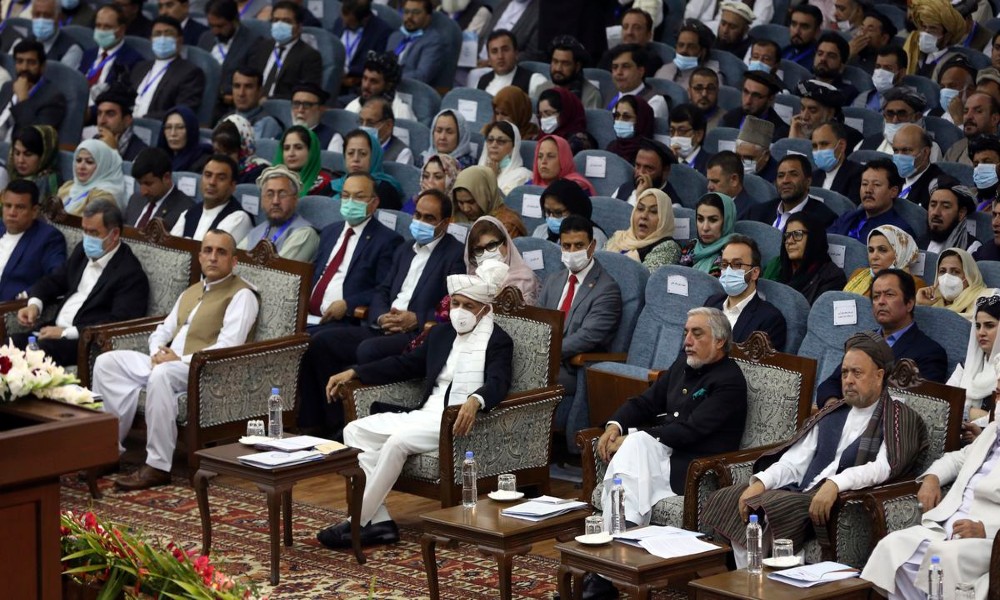
Afghanistan’s Ministry of Public Health on Saturday confirmed 17 Loya Jirga delegates had tested positive for COVID-19.
According to officials, the delegates infected with the virus had not been allowed to enter the hall.
Noorullah Taraki, deputy spokesman for the Ministry of Public Health, said the members of the Loya Jirga who tested positive have been taken to a COVID-19 treatment facility in Kabul.
Critics meanwhile raised their voices on Friday over the apparent lack of adherence to health protocols by the delegates on Friday in a bid to prevent the spread of the virus.
It was clear that very few delegates wore face masks and no social distancing practices were followed as 3,200 delegates sat shoulder to shoulder in the hall.
This comes after a Public Health Ministry report released last week indicated up to 10 million Afghans had been infected with coronavirus – which has had an enormous impact on the country’s already fragile health system and economy.
The Jirga will decide on the fate of 400 Taliban prisoners and the way forward regarding intra-Afghan talks.
Comprising tribal elders, community leaders and politicians, 3,200 people from around the country are attending the event.
Chairing the Jirga is Abdullah Abdullah, Chairman of the High Council for National Reconciliation.
He said Saturday on Twitter that Friday’s deliberations had continued late into the night but that a resolution would be announced on Saturday.
We began the second working day of the Consultative Peace Jirga (CPJ). Yesterday, 33 out of 50 CPJ working committees submitted their suggestions, which continued late into the evening. Today, the remaining 17 committees will submit their suggestion. 1/2 pic.twitter.com/ZBZgWF7Q4P
— Dr. Abdullah Abdullah (@DrabdullahCE) August 8, 2020
“We began the second working day of the Consultative Peace Jirga. Yesterday 33 out of 50 working committees of the #CPJ submitted their suggestions, which continued till late evening. Today, the remaining 17 committees will submit their suggestions.
“The outcome of the committees suggestions on the release of 400 Taliban prisoners & other peace related issues will be announced today. The people of Afghanistan, & the international community looking forward for a positive, & constructive outcome to start the intra-Afghan talks.”
COVID-19
WHO declares end to COVID global health emergency

The World Health Organization said Friday that COVID-19 no longer qualifies as a global emergency, marking a symbolic end to the devastating coronavirus pandemic that triggered once-unthinkable lockdowns, upended economies and killed millions of people worldwide.
The announcement, made more than three years after WHO declared the coronavirus an international crisis, offers some relief, if not an ending, to a pandemic that stirred fear and suspicion, hand-wringing and finger-pointing across the globe, AP reported.
The U.N. health agency’s officials said that even though the emergency phase was over, the pandemic hasn’t finished, noting recent spikes in cases in Southeast Asia and the Middle East.
WHO says thousands of people are still dying from the virus every week, and millions of others are suffering from debilitating, long-term effects.
“It’s with great hope that I declare COVID-19 over as a global health emergency,” WHO Director-General Tedros Adhanom Ghebreyesus said.
“That does not mean COVID-19 is over as a global health threat,” he said, warning that new variants could yet emerge. Tedros noted that while the official COVID-19 death toll was 7 million, the real figure was estimated to be at least 20 million.
Tedros said the pandemic had been on a downward trend for more than a year, acknowledging that most countries have already returned to life before COVID-19.
He bemoaned the damage that COVID-19 had done to the global community, saying the pandemic had shattered businesses, exacerbated political divisions, led to the spread of misinformation and plunged millions into poverty.
When the U.N. health agency first declared the coronavirus to be an international crisis on Jan. 30, 2020, it hadn’t yet been named COVID-19 and there were no major outbreaks beyond China.
More than three years later, the virus has caused an estimated 764 million cases globally and about 5 billion people have received at least one dose of vaccine.
In the U.S., the public health emergency declaration made regarding COVID-19 is set to expire on May 11, when wide-ranging measures to support the pandemic response, including vaccine mandates, will end. Many other countries, including Germany, France and Britain, dropped most of their provisions against the pandemic last year.
When Tedros declared COVID-19 to be an emergency in 2020, he said his greatest fear was the virus’ potential to spread in countries with weak health systems.
Most recently, WHO has struggled to investigate the origins of the coronavirus, a challenging scientific endeavor that has also become politically fraught.
COVID-19
COVID-19 in Iran: Nearly 900 new cases, 24 deaths recorded

The Iranian health ministry announced on Sunday that more than 890 new cases of COVID-19 have been identified across the country during the past 24 hours, adding that 24 patients have died in the same period of time, Fars News Agency reported.
“A sum of 891 new patients infected with COVID-19 have been identified in the country based on confirmed diagnosis criteria during the past 24 hours,” the Iranian Health Ministry’s Public Relations Center said on Sunday, adding, “454 patients have been hospitalized during the same time span.”
The ministry’s public relations center said 611 people infected with COVID-19 are in critical condition.
COVID-19
China says 200 million treated, pandemic ‘decisively’ beaten

China says more than 200 million of its citizens have been diagnosed and treated for COVID-19 since it lifted strict containment measures beginning in November.
With 800,000 of the most critically ill patients having recovered, China has “decisively beaten” the pandemic, according to notes from a meeting of the ruling Communist Party’s all-powerful Politburo Standing Committee presided over by President and party leader Xi Jinping, AP reported.
China enforced some of the world’s most draconian lockdowns, quarantines and travel restrictions and still faces questions about the origins of the virus that was first detected in the central Chinese city of Wuhan in late 2019. Heavy-handed enforcement prompted rare anti-government protests and took a heavy toll on the world’s second-largest economy.
The official Xinhua News Agency quoted Xi as saying that policies to control the outbreak had been “entirely correct.” The abrupt lifting in November and December of the “zero COVID” policy that had sought to eliminate all cases of the virus led to a surge in infections that temporarily overwhelmed hospitals.
Case numbers have since peaked and life has largely returned to normal, although international travel in and out of China has yet to return to pre-pandemic levels.
China is now transitioning to a post-pandemic stage after a fight against the outbreak that was “extraordinary in the extreme,” Xinhua said.
The government will continue to “optimize and adjust prevention and control policies and measures according to the times and situations with a strong historical responsibility and strong strategic determination,” Xinhua said.
-

 Latest News2 days ago
Latest News2 days agoPakistani military jet downed in Afghanistan’s Jalalabad, pilot captured alive
-

 Latest News3 days ago
Latest News3 days agoAfghan Air Force conducts airstrikes in Islamabad, other cities
-
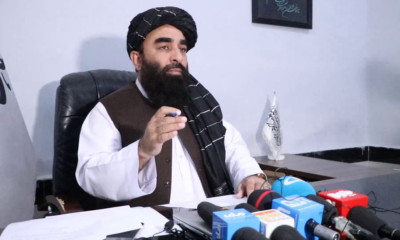
 Latest News3 days ago
Latest News3 days agoIEA: Special circle in Pakistan has launched mission to destabilize region
-

 World5 days ago
World5 days agoIndia’s Modi backs Israel in address at Israeli parliament
-
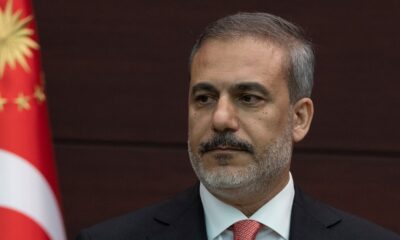
 Latest News3 days ago
Latest News3 days agoTurkey launches initiative to diffuse Afghanistan-Pakistan tension
-

 Regional4 days ago
Regional4 days agoNarendra Modi holds high-level talks after historic address to Knesset
-

 Latest News3 days ago
Latest News3 days agoAfghans say they are united against Pakistan aggression
-

 Latest News4 days ago
Latest News4 days agoPakistan carries out airstrikes after Afghanistan launches retaliatory attacks






